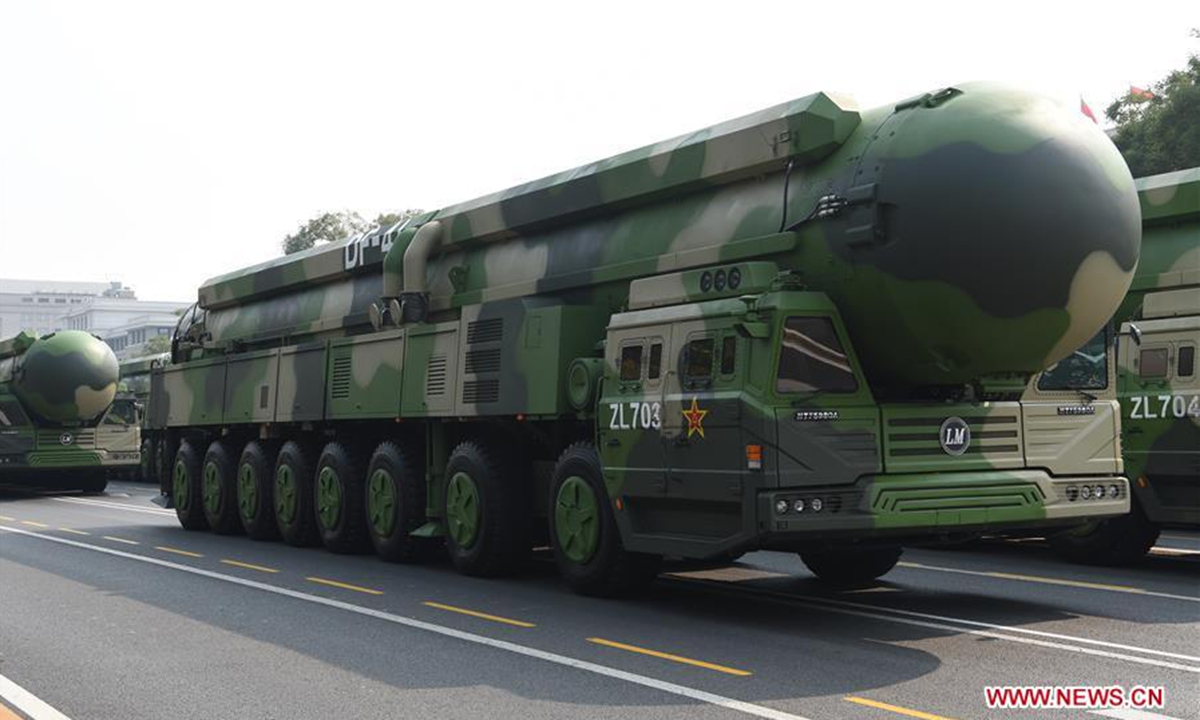China needs to increase nuclear capacity to maintain minimum deterrence against rising US coercion

The formation of Dongfeng-41 nuclear missiles takes part in a military parade celebrating the 70th anniversary of the founding of the People's Republic of China (PRC) in Beijing, capital of China, Oct. 1, 2019. Photo:Xinhua
On Friday, US Secretary of State Antony Blinken expressed his "deep concern" about the "rapid growth" of China's nuclear arsenal with Southeast Asian foreign ministers. He accused Beijing of "sharply deviating from its decades-old nuclear strategy based on minimum deterrence." This is the US' official response from the highest level after various US think tanks over the past few months have claimed that China is building a great number of "new missile silos" in Yumen of Northwest China's Gansu Province and in the Hami region in Northwest China's Xinjiang Uygur Autonomous Region.
Chinese officials have not directly responded to these allegations made by US think tanks. They have neither confirmed nor denied them.
It is important to note that China has never abandoned its minimum deterrence nuclear strategy. However, due to the comprehensive strategic threat that the US keeps posing to China, the nuclear capabilities Beijing needs to achieve "minimum deterrence" are now different from the past. As the potential risk stemming from US nuclear coercion against China is clearly increasing, China needs to have sufficient nuclear forces to contain such a risk.
Even many ordinary Chinese people feel the urgency of strengthening China's nuclear deterrent is common sense. We don't know if those structures shown in the satellite photos in Yumen and Hami are silos or the foundations of wind power plants as some scholars have speculated. But if it does turn out that they really are silos, Chinese public opinion will definitely support the construction of them unconditionally.
Washington is in no moral position to accuse China of this. China has only a fraction of the number of nuclear warheads that the US has. China is also the only nuclear power that has pledged not to be the first to use nuclear weapons. The US has never indicated that it would consider making the same commitment.
There is no information from Beijing on whether it is strengthening its nuclear buildup in the face of a realistic threat from Washington. But even if we were doing that, it would have nothing to do with Southeast Asian countries, or even with Japan and Australia, because China's nuclear policy also includes another firm commitment of not using or threatening to use nuclear weapons against any non-nuclear-weapon state.
Once China substantially strengthens its nuclear forces, its only purpose will be to deter the US. Since there is already no mutual trust between China and the US, Chinese society is fully convinced that the US' ultimate strategic goal is to bring China down. While not giving up on maintaining peace between the two countries, we must be prepared for the possibility that a war could eventually occur in the Taiwan Straits or the South China Sea. One of China's major strategic missions today is to make the most complete layout for that day.
China is already capable of destroying various US conventional military forces that enter China's coastal waters in wartime and striking US military bases in the Asia-Pacific region that support US intervention. Even though the US' naval and air forces are powerful, it has become increasingly difficult for them to gain an advantage in China's coastal waters. China is gradually achieving dominance in conventional warfare in the Taiwan Straits and the South China Sea.
Our next step is to ensure that the US does not dare to impose a nuclear deterrent on China if it loses its conventional military intervention capability. Our nuclear forces must become so powerful that the elites in Washington will tremble in fear at the mere thought of imposing a nuclear deterrent on China.
China's DF-41 Intercontinental Ballistic Missile, and sea- and air-based nuclear forces have greatly increased the country's ability to survive and created a credible Chinese nuclear retaliation capability. As US policy toward China over the past few years has demonstrated a certain derangement, we need to not only increase our second-strike capability, but also make Washington keep in mind all the time that we can retaliate. This is to ensure that whenever the US has the extreme impulse to suppress China, it will immediately remember not to take things to the level of a military showdown between the two countries, and thus, calmness and balance will be maintained.
Southeast Asian countries, including US allies, should avoid being misled by the US. They need to believe that once China strengthens its nuclear forces, it is solely to maintain peace and suppress the US' warmongering ideas. In other words, the stronger China's nuclear forces are, the more it is guaranteed that the US will not do something silly. This is the ultimate advice to the US in a way that it can best understand so that it will not provoke wars in the Taiwan Straits and the South China Sea.
The author is editor-in-chief of the Global Times. opinion@globaltimes.com.cn

